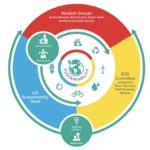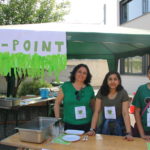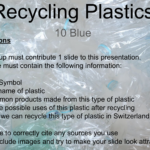Some of the actions included: setting up recycling stations and eliminating disposable packaging at school events (reducing waste by up to 75 percent per event), setting up “Brocki” stations for used office supplies and organising a book donation, training for caretakers and cleaners to improve waste management, dissemination of information material to raise awareness among the school community through various channels (e.g. websites, posters, newsletters, pictograms) and visits to a recycling center.
International School Basel
A project that mobilises the whole school community
Step 1: Form an Eco-Committee
The Eco-Committee of the International School Basel (ISB) coordinates the Eco-Schools project across the three campuses of the school. It gathers representatives from all stakeholder groups of the school community: students from all school levels, who are also active in campus-specific “student sustainability groups”, teachers, members of the parents’ “sustainability team”, facilities staff, the communication department and the school management. Everyone can contribute their ideas and points of view.
«By the time ISB joined the Eco-Schools programme we had implemented several activities on this theme as it was of great interest to our students. Waste pollution and in particular the impact of plastic pollution on the environment, touches the hearts of many within our community, and is a serious issue around the globe and thus we all have an important role to play, that resonates with a key core value encouraged at ISB that is for our community to be responsible global citizens.»
Reduce waste volumes and increase awareness
Step 3: Create an Action Plan
Based on a comprehensive analysis of the waste produced at each campus and a school-wide survey that revealed some knowledge gaps concerning waste management and the impact of waste in Switzerland, the school community defined objectives and actions to increase their awareness of waste issues, reduce their waste volumes, and improve recycling.
Some of the actions included: setting up recycling stations and eliminating disposable packaging at school events (reducing waste by up to 75 percent per event), setting up “Brocki” stations for used office supplies and organising a book donation, training for caretakers and cleaners to improve waste management, dissemination of information material to raise awareness among the school community through various channels (e.g. websites, posters, newsletters, pictograms) and visits to a recycling center.
«On the basis of the results of the Waste Audit and past actions, we identified general actions to be implemented to address each one of the audit’s main findings. The objective of this Action Plan is to provide an organised roadmap on how to address the issues identified at school in reference to waste. It also serves as a way to easily identify potential synergies within any specific campus and across campuses. The plan is a living tool, as it will be constantly evolving to incorporate new activities to address existing issues, or to address new identified issues.»
Getting teachers on board
Step 5: Links to the Curriculum
The Eco-Committee approached the link between the curriculum and the Eco-Schools project in two ways: As part of the audit, they created an inventory of existing classroom initiatives where students explore sustainability issues by contacting all teachers. Additionally, the teachers were regularly kept informed about the activities of the Eco-Schools project. This inspired some teachers to take the lead and amend some of their units to address issues of sustainability and waste in particular.
«One of the Design teachers in Senior School shared with us a pre-completed unit on globalisation and sustainability that the design team wanted to implement. However, they wanted to re-design it with the support from the Eco-Committee chair and co-chair to align with the work the school was doing with waste. This example shows how teachers have identified the need to modify and review their planning to include meaningful opportunities for students to engage in the exploration, research and understanding of issues related to sustainability.»
Support student-led initiatives and engage with the local community
Step 6: Inform and Involve
The Eco-Committee and its associated groups took special care to support and empower all members of the school community who expressed an interest in developing their own initiatives on sustainability issues, including those who were not actively involved in any of these groups. The school also used the Eco-Schools project as an opportunity to connect with the local community.
«We participated in the Clean Up Day 2020. Inspired by the drive of one of our Grade 1 students, who was keen on having the school take part in this important activity, a group of parents with the support of the Eco-Committee organised the participation of ISB. Our participation served a double purpose. On the one hand, raise awareness and promote action of our community on the issue of litter in Switzerland, while also get involved and collaborate with local organisations, on the other.»
Step 7: Create an Eco-Code
As a conclusion to their first Eco-Schools project, the school community held an art competition. Three artworks (one per campus) and a motto were chosen to represent the school’s commitment to sustainable development as an Eco-Code.

The project
What about waste at our school?
The students of the International School Basel took a close look at the waste generated at the school and examined how aware the school community is of the topic by means of an entertaining quiz. Their testimonial on video!
One idea mobilises the whole school
The International School Basel shows how the initiative of a Grade 1 student can inspire whole-school action against littering.
Art for our planet
The International School Basel has chosen three inspiring artworks by students as its Eco-Code. The students explain what message they want to convey with their artwork.











